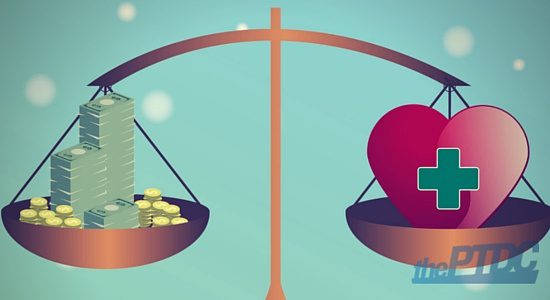Most people fail to recognize that the underlying principles behind the equations for success in both health and wealth are essentially the same. Whether you want to lose weight or increase your income, the core formula forms a solid foundation. Take a look:
Calories in vs. calories out
Money in vs. money out

Looking at the equation more closely, we know that in order to lose weight we need to decrease "calories in" by eating a healthier diet, which indirectly can reduce the number of calories, but we also increase "calories out" by exercising. You could look at each side of the equation in isolation, but it'd take you longer to achieve your goals, and ultimately, you might never achieve the physique you desire.
Similarly, if you want to become financially stable or "well-off", you can decrease "money out" by going on a "financial diet", where you control your spending, and increasing "money in", where you work more (or smarter).
And just as with the calories equation, you can't achieve true wealth by focusing on only one side of the equation. Because if you don't earn "enough" to support your basic costs, no amount of saving can improve your financial situation.
It's okay if you didn't notice the similarities in these equations before. Normally, finance and fitness are two separate and unrelated parts in your life. But if you just dig a little deeper, you'll find striking similarities between them and how they raise some interesting questions about the way you manage your money.
Eliminate domain dependence and optimizing for success.
Domain dependence is a concept that I read about in Nassim Taleb's excellent book, Antifragile: Things That Gain From Disorder.
It explains your inability to recognize that skills from one "domain" (for example, health and fitness) can actually be transferred to another (money and wealth, in this case).
This happens because people view things differently, depending on the domain or environment they are in. For example, a successful accountant might be capable of managing a company's finances to the exact penny, while his own finances lie in tatters.

Realize that the underlying principles between these different domains are actually the same.
Both areas benefit from setting clear goals, educating yourself on the best techniques to achieve your desired outcome, tracking your progress, and being able to evolve when your results start to plateau.
You also build "assets" in both. In fitness, lifting weights and building muscle increase your BMR, effectively increasing your "calories out" number even when you're not exercising. Likewise, property investments or stocks and shares generate income without the need for your daily attention and increase your baseline "money in" number.
Mindset is more important than anything.
Achieving success in either requires grit and determination to stay the course. Just as you need the right outlook and mindset to overcome the excuses to avoid going to the gym, you need to be able to dig deep to put the extra hours in if you want to achieve financial success.
Now that you've starting thinking about your money in terms of diet and exercise, let's go over three different approaches you can take to start making positive changes to your business.
1. Don't overthink your strategy.
"Don't overthink it" sounds like obvious advice, yet many people overcomplicate the way they approach business. They think there must be a really clever way to do things, or a trick that will help them see results quicker (just like with weight loss!).
There are so many tips and tricks out there. For example, you could invest in flyers, SEO, radio ads, or any number of alternatives to market your business.
You could also get on the phone and make 100 calls a day. But here's what you should really do:
Stop wasting time looking for clever exercises.
Finding the "perfect" marketing strategy for your business is difficult, puts a strain on your resources, and makes you lose focus, which leads to mediocre results. SEO might seem like a great idea if your business hinges on content, but success is uncertain: At best, it will take many months before you start seeing a return on investment (if any).
Instead, do more "reps" of the tried and tested ones. Look for simple solutions that are more likely to deliver results as you stick with them over time.
You could start with the phone book for your local area. Phone all the companies within a 10-mile radius and ask them if they'd like to offer discounted personal training sessions to their employees.
This is a very low-tech and low-cost solution, but sometimes these methods just give you a much more direct link to your customers and a higher chance of success.
2. Build some financial muscle.
As a personal trainer, your income is probably closely tied to the number of hours you work, or when you're with a client. By investing in building an "asset", you can diversify your income and create new revenue streams. Let me explain what I mean.
Traditionally, people think of shares or property as assets, but for trainers, assets can be an information product, like a newsletter or ebook, that would keep earning you money even while you sleep. Of course, this is easier said than done and requires plenty of steps by itself.

But to build an engaging information product that people are willing to buy, you have to address a real problem or pain point. You may already have some themes in mind from previous interactions with clients, but the most sure-fire way to find ideas is to ask them directly.
For example, if you find yourself constantly giving people the same advice on nutrition, you could condense these frequently asked questions into a product that you sell through your website or Facebook page.
- Start by collecting common questions in a Word document, then take time to answer each of them in a direct and concise way that removes any ambiguity for the reader (that means no jargon or science-y stuff). You could even include links to other sources if people choose to explore the topic further.
- Share this document with a few of your clients and ask them which bits are useful and what else they would like to know on the topic. Use the feedback to keep improving future iterations of the document. If you have the budget, you can find freelancers through sites like Upwork and PeoplePerHour, who will be able to professionally edit and format your words into a sellable condition.
- Once you've built up a really useful resource (based on client feedback), you can start to offer it for sale. It could be as simple as selling a PDF file through your existing website (a platform like eJunkie can help you process payments).
Alternatively, you could publish the information as an ebook through Amazon, the details of which can be found here. There are even freelancers available who will help put your text into the correct format for Amazon (this step can be a real time-saver).
Once you have your written document, you could turn it into a video series or a podcast. If you want to go down this path, you may want to consider the Udemy course, How to Create Information Products from Scratch.
The bottom-line here is that there are a vast array of options for building information products.
3. Invest in success.
In the same way that you stay updated on new developments in nutrition and exercise, educate yourself more on the business side of things and ways to grow your business. Read sites like Harvard Business Review for general business management.

If you're at wit's end, you can consider whether you should invest in a personal trainer for your business, such as business coach or marketing professional who can help you to grow your client base. By finding the right one that fits your goals and has had experience doing something similar to what you want to do, you can learn a great deal from him or her. And by having a basic understanding of the topic (from reading), you are able to ask the right questions of your mentors.
In other words, keep learning and educating yourself. Invest in your education, knowledge, and skills because they'll pay you back in dividends.
It all comes down to this idea: The core principles that determine success in health and wealth, and in fact many areas of life, are more or less the same. As you come to understand and appreciate these links, you could expand the range of services you offer to your clients.
Other trainers found these articles helpful:
- Can Personal Trainers Give Diet and Nutrition Advice to Clients? by John Berardi
- The Key to Fitness Business Success: Follow Your Own Advice by Jennette Holzworth
- 3 Tips for a Successful Career in Fitness by Tammy Lee Bower










